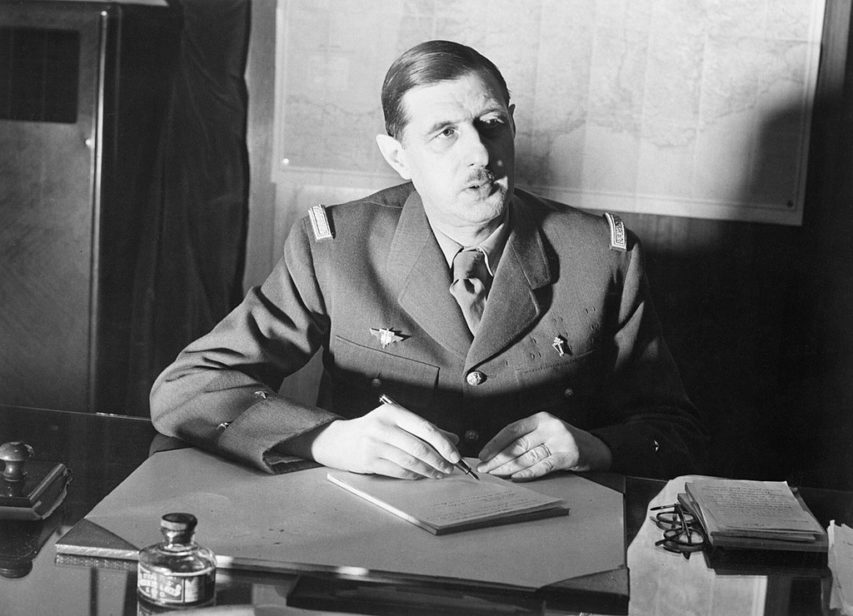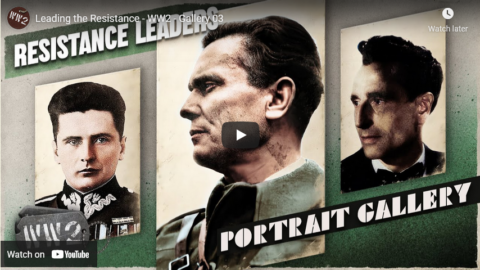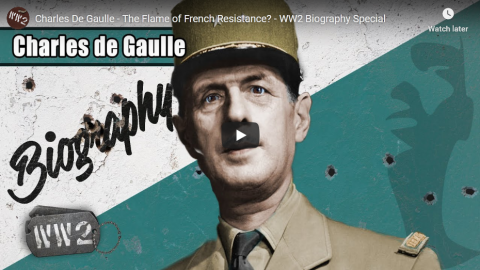World War Two
Published Feb 8, 2024While World War Two looks like it is about to end, the belligerent powers have vastly different goals for that end. Differences that may or may not prolong the war, will decide the survival of tens of millions of people, and the future fate of all of Humanity.
(more…)
February 10, 2024
The War Goals to End WW2 in 1945 – a WW2 Special
January 7, 2024
1945 Begins! – WW2 – Week 280 – January 6, 1945
World War Two
Published 6 Jan 2024The Germans launch a new offensive, Operation Nordwind, in Alsace, even as their offensive in the Ardennes is stalled. The Allies in the west don’t just have to fight these, they are also having serious issues amongst themselves in High Command that threaten their unity. The siege of Budapest is in full swing and is a hard, fought, bloody battle, and the Soviets and the Americans have big plans for new offensives soon to kick off in Eastern Europe and the Philippines (respectively).
00:00 INTRO
01:20 The Siege of Budapest
04:51 German defense plans in the East
06:38 Montgomery versus Eisenhower
08:32 Eisenhower versus the French
10:35 New German Offensive in Alsace
13:49 Monty’s plans for the press
15:04 The Battle of the Bulge
17:45 Preparations for the Luzon Landings
20:56 Notes to end the week
21:51 Summary and conclusion
(more…)
July 8, 2023
The Perfect D-Day That History Forgot
Real Time History
Published 7 Jul 2023The summer of 1944 saw the Allies land in France not once but twice. Two months after Operation Overlord, the Allies also landed in Southern France during Operation Dragoon. It was “the perfect landing” and opened up the important ports of Marseille and Toulon for Allied logistics.
(more…)
January 13, 2023
Is the French Resistance Defeated by 1944? – War Against Humanity 095
World War Two
Published 12 Jan 2023While the Soviet Union declared they will annex parts of Poland, the Western Allies fear that the broken French Resistance may ruin the plans for D-Day.
(more…)
November 15, 2022
Look at Life — Moving Day (1967)
PauliosVids
Published 20 Nov 2018How the headquarters of NATO was moved from France to Belgium.
May 12, 2022
QotD: De Gaulle and FDR
It was more profound than that. France was now too small as well, and that is the reason why de Gaulle’s story is in the end a tragedy. Postwar America simply could not permit France to continue as she had. Washington would not risk another 1939. The former powers of Europe had to be cut down to size and compelled to get on with one another.
De Gaulle’s struggles with Churchill were, by comparison, lovers’ tiffs. Churchill, like most civilized Englishmen, loved France, “that sweet enemy”, as Philip Sidney called her. While de Gaulle was cold to veterans of the Resistance, Churchill — when he went to Paris to meet them — was so moved by their bravery that he was in tears for most of the day.
De Gaulle’s quarrel with Roosevelt was based on real loathing. Washington’s vision for postwar Europe, in which the old nations would be diminished and homogenized, was directly opposed to de Gaulle’s idea of a French resurrection in glory and might. Washington loved and promoted the idea of a Europe dominated by supranational bodies, and would later use Marshall aid and the CIA to spread the idea of a European union. Jean Monnet, one of the founders of the eventual European superstate, was much more welcome in the U.S.A. than de Gaulle, whom FDR once airily dismissed as “the head of some French committee.” No doubt, this was what Roosevelt wished he was. Nancy Mitford, in her satirical 1951 novel, The Blessing, neatly caricatured this American unifying vision of the new Europe in the figure of the appalling American world-reforming bore, Hector Dexter, who dreamed of seeing a bottle of Coca-Cola on every European table:
When I say a bottle of Coca-Cola I mean it metaphorically speaking, I mean it as an outward and visible sign of something inward and spiritual. I mean it as if each Coca-Cola bottle contained a djinn, and as if that djinn was our great American civilization ready to spring out of each bottle and cover the whole global universe with its great wide wings.
In May 1962, de Gaulle would oppose to this his assertion that Europe could not be real “without France and her Frenchmen, Germany and her Germans, Italy and her Italians.” He said (a recording of the performance still exists) that Dante, Goethe, and Chateaubriand “belong to Europe,” precisely because they spoke and wrote as Italians, Germans, or Frenchmen. They would not, he jeered, have served Europe much if they had been stateless and had written in some form of Esperanto or Volapük.
Peter Hitchens, “A Certain Idea of France”, First Things, 2019-04.
May 7, 2022
QotD: De Gaulle’s France
De Gaulle was as much a Victorian as Churchill, but he lasted much longer, striding into the modern era not just as an object of reverence but as an active political force. His childhood in France’s austere northern regions was soaked in patriotism and religion, administered and absorbed in strong doses which would now be regarded as dangerous. In those years of toy soldiers and strict mealtimes he learned, among other things, to dislike, mistrust, and resent the ancient English foe, so much that he would never fully shake off these feelings. His was the France wounded and dismembered by the debacle of the 1870 Franco-Prussian war, appalled by the rising of the Paris Commune, shaken and divided by the wrongful humiliation, prosecution, and cruel imprisonment of Captain Dreyfus. The shadow of Germany was unavoidable. In Paris, the statue on the Place de la Concorde that represented the city of Strasbourg was veiled in black, in mourning at its seizure by the German Empire. Professor Jackson tries hard to acquit de Gaulle of any allegiance, then or later, to the anti-Dreyfus faction. There is no doubt that de Gaulle in his later life was far too intelligent to fall for the crude anti-Semitism that infects so much French conservatism and was especially strong in de Gaulle’s youth. Still, it is hard to accept that he was never touched by it, and in moments of strain he would make remarks or use derogatory words that no person should make or use.
Peter Hitchens, “A Certain Idea of France”, First Things, 2019-04.
April 8, 2022
QotD: The fearlessness of De Gaulle
Like many monsters — for he could be a monster to those who defied him, and was often cruel and unfair to his most devoted supporters — he had enormous charm when he chose to turn it on. He was deeply mischievous and enjoyed puzzling and wrong-footing others. When he did not wish to give ground, he could be obtuse, an experience described by one victim as like “being confined … with a cormorant who spoke only cormorant.”
The evidence suggests that he was one of those dangerous people who simply do not know what fear is, and that he discovered this quite early in his long life. If a sergeant had not fallen dead on top of the young Lieutenant de Gaulle when he first went into battle at Dinant in August 1914, he would probably have died in some useless, gallant sacrifice and never have been heard of again. If he had not been knocked unconscious by the blast of a grenade at Verdun in March 1916, it is hard to believe that he would have allowed himself to be taken prisoner by the Germans. In that case he would almost certainly have died in that frightful battle, or not long afterward, another silent shade in that huge legion of shades who marched off into the dark during that appalling war.
Only his wife Yvonne was unimpressed by his grandeur, more than once urging him to retire, or puncturing his ambition. During the long, frustrating wilderness years between his wartime glory and his final presidential triumph, he mused to her that he might one day repeat his great rallying call of 1940. Using the rather patronizing endearment “Pauvre Ami,” she declared flatly, “Nobody will follow you.” He snapped back, “Shut up, Yvonne! I am old enough to know what I want to do!” In fact, on that occasion he was wrong and she was right. She even mocked his soldierly abilities. When the general’s aides suggested that they might install a machine gun at their remote, forbidding country home in Colombey, in case of an attack by communists, Yvonne scoffed that her husband would have no idea how to use it. Perhaps she would have.
Peter Hitchens, “A Certain Idea of France”, First Things, 2019-04.
April 9, 2021
Leading the Resistance – WW2 – Gallery 03
World War Two
Published 8 Apr 2021Under the violent occupation by Axis forces, dozens all over the globe resisted or took up arms to fight for the survival of their nation, ethnicity, ideology or ideals.
Join us on Patreon: https://www.patreon.com/TimeGhostHistory
Or join The TimeGhost Army directly at: https://timeghost.tvFollow WW2 day by day on Instagram @ww2_day_by_day – https://www.instagram.com/ww2_day_by_day
Between 2 Wars: https://www.youtube.com/playlist?list…
Source list: http://bit.ly/WW2sourcesHosted by: Spartacus Olsson
Written by: Spartacus Olsson and Joram Appel
Director: Astrid Deinhard
Producers: Astrid Deinhard and Spartacus Olsson
Executive Producers: Astrid Deinhard, Indy Neidell, Spartacus Olsson, Bodo Rittenauer
Creative Producer: Maria Kyhle
Post-Production Director: Wieke Kapteijns
Research by: Joram Appel
Edited by: Miki Cackowski
Sound design: Marek Kamiński
Map animations: Eastory (https://www.youtube.com/c/eastory)Colorizations by:
Mikołaj Uchman
Dememorabilia – https://www.instagram.com/dememorabilia/Sources:
Marxist Internet Archive
Picture of Tito during a Partisan gathering, courtesy of Музеј Старе Херцеговине
Yad Vashem 75FO4, 4613/899, 4248/20, 1605/91
Bundesarchiv
USHMM
IWM NA 15129Soundtracks from the Epidemic Sound:
Phoenix Tail – “At the Front”
Reynard Seidel – “Deflection”
Hakan Eriksson – “Epic Adventure Theme 4”
Johannes Bornlof – “The Inspector 4”
Fabien Tell – “Last Point of Safe Return”
Howard Harper-Barnes – “London”
Rannar Sillard – “March Of The Brave 10”Archive by Screenocean/Reuters https://www.screenocean.com.
A TimeGhost chronological documentary produced by OnLion Entertainment GmbH.
April 17, 2020
Charles De Gaulle – The Flame of French Resistance? – WW2 Biography Special
World War Two
Published 16 Apr 2020Charles De Gaulle is a towering figure in history, and not just because of his height. Becoming increasingly political in the interwar years due to his unorthodox views on military strategy, The Fall of France will thrust him into the limelight.
Join us on Patreon: https://www.patreon.com/TimeGhostHistory
Or join The TimeGhost Army directly at: https://timeghost.tvFollow WW2 day by day on Instagram @World_war_two_realtime https://www.instagram.com/world_war_t…
Between 2 Wars: https://www.youtube.com/playlist?list…
Source list: http://bit.ly/WW2sourcesHosted by: Indy Neidell
Written by: Francis van Berkel
Director: Astrid Deinhard
Producers: Astrid Deinhard and Spartacus Olsson
Executive Producers: Astrid Deinhard, Indy Neidell, Spartacus Olsson, Bodo Rittenauer
Creative Producer: Joram Appel
Post-Production Director: Wieke Kapteijns
Research by: Catherine Burton
Edited by: Mikołaj Cackowski
Sound design: Marek Kamiński
Map animations: Eastory (https://www.youtube.com/c/eastory)Colorizations by:
Carlos Ortega Pereira, BlauColorizations, https://www.instagram.com/blaucoloriz…
Dememorabilia – https://www.instagram.com/dememorabilia/
Norman Stewart – https://oldtimesincolor.blogspot.com/
Adrien Fillon – https://www.instagram.com/adrien.colo…
Sources:
Outdoor family portrait, with lurkers (c.1920), courtesy pellethepoet https://flic.kr/p/ompxgf
IWM A 1464, E 2324, D 1966
Frederick Milthorp collectionSoundtracks from the Epidemic Sound:
Max Anson – “Ancient Saga”
Farell Wooten – “Blunt Object”
Johannes Bornlof – “Deviation in Time”
Reynard Seidel – “Deflection”
Johannes Bornlof – “The Inspector 4”
Phoenix Tail – “At the Front”Archive by Screenocean/Reuters https://www.screenocean.com.
A TimeGhost chronological documentary produced by OnLion Entertainment GmbH.
December 19, 2019
Vive la Résistance! well, not really… French Resistance 1940 – WW2 – War Against Humanity 007
World War Two
Published 18 Dec 2019Immediately after France is occupied by the Nazis in 1940, the French are divided about what to do; resist for collaborate? To put it mildly, it’s complicated.
Join us on Patreon: https://www.patreon.com/TimeGhostHistory
Or join The TimeGhost Army directly at: https://timeghost.tvFollow WW2 day by day on Instagram @World_war_two_realtime https://www.instagram.com/world_war_t…
Join our Discord Server: https://discord.gg/D6D2aYN.
Between 2 Wars: https://www.youtube.com/playlist?list…
Source list: http://bit.ly/WW2sourcesWritten and Hosted by: Spartacus Olsson
Produced and Directed by: Spartacus Olsson and Astrid Deinhard
Executive Producers: Bodo Rittenauer, Astrid Deinhard, Indy Neidell, Spartacus Olsson
Creative Producer: Joram Appel
Post-Production Director: Wieke Kapteijns
Research by: Spartacus Olsson and Francis van Berkel
Edited by: Wieke Kapteijns
Map animations: Eastory (https://www.youtube.com/c/eastory)Colorizations by: Julius Jääskeläinen – https://www.facebook.com/JJcolorization/
Sources: Bundesarchiv, Mémorial de la Shoah
Icons via the Noun Project: collaboration by Pause08, protester by Blaise Sewell, Dove by Luis Prado, confused by LlisoleArchive by Screenocean/Reuters https://www.screenocean.com.
A TimeGhost chronological documentary produced by OnLion Entertainment GmbH.
From the comments:
Spartacus Olsson
16 hours ago
In the aftermath of WW2, everyone was probably pretty tired of the whole tragedy, and ready to just move on. Many of the people that I have met that lived through the war didn’t like talking about the war much. But somehow I had the privilege of getting many of the them that I met to open up and talk about it to me. Maybe not so much because of any personal quality I have other than being very persistent and curious — a pain in the neck is another way of putting it.Anyway, we talked about many things, terrible things, great things, sad, and happy stories. But there was one thing I never heard anybody talk about, and that was indecision. Fear and regret, yes — everyone spoke of that, but not indecision. There was always an undertone of manifest destiny or complete meaninglessness.
But, when you think about it, how could you not be indecisive when faced with this kind of calamity? How can you not wonder if this is destiny, or just bad luck? How can you not be shocked into a stupor, at least at first? And even if you’re an ideologically convinced partisan or combatant, how do you know for sure what the right thing to do is? Well, when you start looking into it all, those questions were pretty much what gripped France in 1940 after the sudden, tragic loss of independence.
I think that indecision is not something we want to remember, perhaps we shouldn’t if we want to stay our course, perhaps we’re wired not to, so that we can focus better on what we finally decide. But for others who want to learn from our mistakes, and our successes — it is in the moment of indecision that we display our thinking, our reasoning, the true origin of our cause.
I should also tell you that I grew up in France, so this is in many ways the story of the adults around me when I was a child.
October 11, 2019
June 7, 2019
QotD: Ruling France
From the French Revolution in 1789 to the ascension of Charles de Gaulle in 1958, France had an absolute monarchy, three constitutional monarchies, a directory, a consulate, two empires with one restoration, four republics, two provisional governments, a government in exile, and the hobnailed jackboot of Nazi occupation: 17 distinct regimes in 169 years.
De Gaulle, with his Fifth Republic, appeared to have settled the ancient argument between the monarchists and the republicans by creating a monarchy and calling it a republic. But the presidents of that republic — de Gaulle, Pompidou, Giscard d’Estaing, Mitterand, Chirac, Sarkozy, Hollande — have been a downward sequence. Each was at least slightly, and sometimes sharply, less talented than his predecessor.
In 2017, in utter exasperation, France embraced a 39-year old former banker and senior financial civil servant who had no more sought elective office than had Donald Trump before running for president, Emmanuel Macron. He achieved the office not by gaining control of a political party; French political parties are very fluid and rise and disappear and change their names every few years, but by standing as an independent and setting up a new party of rank political amateurs as legislators. It was magnificent in the country of Jean-Jacques Rousseau and other triumphant theorists. It ran on a euphoric platform: a green revolution, lower taxes, a better social benefit system, completed unification of Europe, stronger armed forces, everything that was desirable and the quick elimination of all that was not.
The predictable happened and Macron is now diminished by the incoherent rioting every weekend of mobs of angry bourgeois crabbing about taxes, reinforced by outright hooligans, all wearing the silly yellow vests all French drivers are required to have in their automobiles so they can put them on to signify an emergency. It is that splendid French combination of the perfect goal and the absurd result.
Conrad Black, “What’s the Matter With Europe?”, New English Review, 2019-05-06.
April 15, 2019
QotD: De Gaulle and the BBC
Above all he loved France, or the idea of it. He saw in the defeat of 1940 a danger that his country would simply disappear, having failed to defend itself and having fled from the battle without properly drawing its sword. This was not a foolish fear. Great civilizations can and do vanish, and one of the best ways of doing so is to abandon the struggle to survive.
He must have greatly resented the fact that he owed so much to Britain. He was intelligent enough to know that Britain, a country few Frenchmen can ever fully trust, was his best hope and only refuge. He understood, as many French patriots could not, that the terrible attack on the French fleet by the British Navy at Mers-el-Kébir in 1940 was in fact necessary, in case its great ships fell into the hands of the Germans. He would have done the same himself had the position been reversed, and he knew it. It was this generosity of mind that made him great. But how he must have loathed being dependent on the British Broadcasting Corporation for his access to the French people. For it was the BBC that made him. Until he finally appeared for the tumultuous, ecstatic liberation of Paris in 1944, he was only a voice, heard fleetingly on illegal broadcasts. Almost nobody in France had the faintest idea what he looked like. But all had a certain idea of de Gaulle, the spirit of France that refused to surrender. And when they finally saw this towering, fearless figure walking calmly down the Champs-Élysées amid the snipers’ bullets, he did not disappoint them. He was, it turned out, a giant so tall that one could imagine ice forming on his upper slopes when—as so often happened—he was annoyed or impatient with his people. His great height set him apart from the beginning. He once complained, “We giants are never at ease with others … the armchairs are always too small, the tables too low, the impression one makes too strong.”
Peter Hitchens, “A Certain Idea of France”, First Things, 2019-04.
March 15, 2019
Charles De Gaulle
Colby Cosh linked to an interesting Peter Hitchens review of a recent biography of Charles De Gaulle (De Gaulle by Julian Jackson):

General Charles de Gaulle, Commander of Free French Forces, seated at his desk in London during the Second World War.
Photo via Wikimedia Commons.
When it came to what de Gaulle thought was the pivotal moment in his life, when he could become virtual monarch of France under conditions chosen wholly by himself, he was as ruthless as Lenin. He had, it is often said, a “certain idea of France.” But the ultra-conservative lawyer, Jacques Isorni, whose clients included the collaborationist Vichy leader Marshal Philippe Pétain and de Gaulle’s would-be assassin, Jean-Marie Bastien-Thiry, concluded that it was “an abstract idea of France, indifferent to the sufferings of the French people.” There is something to this. De Gaulle represented the steely warlike France, summoned up by Bonaparte and again a century later at Verdun, for which the French were required to die and mourn uncomplainingly. For him, Paris was well worth a lie or a betrayal, because his supremacy was so essential for the country he loved.
The costs of de Gaulle’s idea of France were high. As the general himself once mused, “There is no action in which the devil has no part.” The two massacres, and the charnel-house stench which clings to them, are evidence of the reliable rule that even — often especially — the greatest and best of men have terrible flaws and can do terrible things; and also of the other rule that power tends to corrupt. I have begun with them because they are a necessary antidote to the feelings of admiration and liking which any reader of this thrilling, witty, ceaselessly moving, beautifully written account of a truly great man is bound to feel.
Charles de Gaulle’s life would perhaps have been better lived in the seventeenth or eighteenth century, in times when personal courage, mystical imagination, chivalry, and religious fervor were more welcome than they are now. In this world of the United Nations, risk assessment, lawyers, Geneva Conventions, television and superpowers, there is not really enough room for such a man to swing his sword, just as there is no room for old-fashioned great powers in the shadow of superpowers. Had he not been so magnificent, he would have been ridiculous. He looked, more than anything else, like a camel, not least because of the superior expression on his face suggesting that he alone knew the secret One Hundredth Name of God, which camels are supposed to know.
He was filled with shining, old-fashioned beliefs about honor, courage, shame and humiliation, glory and infamy. And as those who conversed with him found, he was perhaps the last great man to make it his business to know those things that it is proper for a king to know. He could talk fluently with philosophers and literary novelists. He had a minute knowledge of history: not just that of France, but of Europe and the world. After many, many conversations with Winston Churchill, a large number of them furious quarrels, he concluded that England’s savior was not in fact very intelligent. He believed wartime, with its austerity and tests of manhood, was more virtuous than peacetime. He believed nothing important could be achieved without recklessness. He stood up to people with considerable courage, even when he was a powerless and lonely figure without soldiers, money, or supporters. He once justified his bloody-minded awkwardness by pointing out that if he were not so difficult, he would himself have been a collaborator. He said “If I were easy to work with, I would be on Marshal Petain’s staff.” He had no time for people like himself. He confessed, “I only esteem those who stand up to me but unfortunately I cannot stand them.”
De Gaulle possessed that great chivalrous virtue of being ready to walk unbowed and defiant in front of the powerful, while being gentle and even submissive to the defenseless and weak. He once became so angry with Churchill that he smashed a chair in his presence to emphasize his rage. Likewise, he defied Franklin Roosevelt over and over again. But he would go home after these battles to sing tender love songs to his daughter Anne, who suffered from Down syndrome. The tiny glimpses we have of this part of his life, obtained from the accidental observations of others, tear at the heart. His concern for Anne was entirely private and not at all feigned. After any long absence from home his first act was to rush up to her room. She died, aged twenty, in his arms. At her funeral, he comforted his wife Yvonne with the words, “Maintenant, elle est comme les autres” (“Now she is like the others”), which must be one of the most moving things said in the whole twentieth century.






